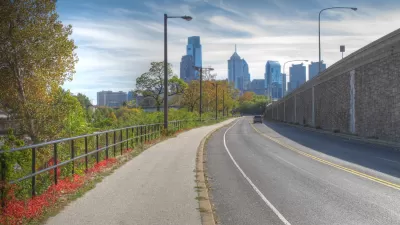It's been 21 years (and counting) since D.C. developed plans to build the Metropolitan Branch Trail's eight mile northern segment. The delayed project threatens the city's goal of increasing the proportion of biking and walking trips to 25 percent.
"Twenty-one years after plans were first devised -- and seven years after D.C.'s bike master plan called for its completion -- a planned eight mile bicycling and walking trail that may eventually connect Union Station and Silver Spring is still years away from being finished," reports Martin DiCaro.
Though the Metropolitan Branch Trail was the scene of an unprovoked attack this summer, it remains a popular bike route and a centerpiece of efforts to increase biking and walking mode share within the city.
"The issue is not money," explains DiCaro. "When construction eventually begins, DDOT has funding programmed into its budget to finish the eight-foot wide trail within Washington, whose completed southern segment (1.5 miles from Union Station to the Brookland neighborhood) sees 15,000 bicyclists and pedestrians per month. The biggest unresolved issue remains property conflicts near the Fort Totten Metro station: the Met Branch Trail must navigate a municipal trash transfer station, privately-owned railroad tracks and a concrete factory, onto National Park Service property and around land owned by Metro."
FULL STORY: First Envisioned 21 Years Ago, a D.C. Biking and Walking Path Remains Unfinished

Planetizen Federal Action Tracker
A weekly monitor of how Trump’s orders and actions are impacting planners and planning in America.

Maui's Vacation Rental Debate Turns Ugly
Verbal attacks, misinformation campaigns and fistfights plague a high-stakes debate to convert thousands of vacation rentals into long-term housing.

San Francisco Suspends Traffic Calming Amidst Record Deaths
Citing “a challenging fiscal landscape,” the city will cease the program on the heels of 42 traffic deaths, including 24 pedestrians.

Amtrak Rolls Out New Orleans to Alabama “Mardi Gras” Train
The new service will operate morning and evening departures between Mobile and New Orleans.

The Subversive Car-Free Guide to Trump's Great American Road Trip
Car-free ways to access Chicagoland’s best tourist attractions.

San Antonio and Austin are Fusing Into one Massive Megaregion
The region spanning the two central Texas cities is growing fast, posing challenges for local infrastructure and water supplies.
Urban Design for Planners 1: Software Tools
This six-course series explores essential urban design concepts using open source software and equips planners with the tools they need to participate fully in the urban design process.
Planning for Universal Design
Learn the tools for implementing Universal Design in planning regulations.
Heyer Gruel & Associates PA
JM Goldson LLC
Custer County Colorado
City of Camden Redevelopment Agency
City of Astoria
Transportation Research & Education Center (TREC) at Portland State University
Jefferson Parish Government
Camden Redevelopment Agency
City of Claremont




























